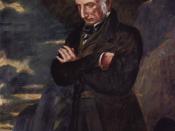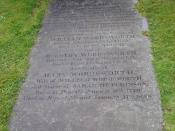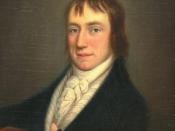William Wordsworth's poetry is characteristic of poetry written during the Romantic period. His pantheism and development of ambiance, the thoughts and feelings expressed and the diction Wordsworth employs are all symbolic of this period's poetry. In this paper, these characteristics will be explored and their "Romantic" propensities exposed. This will be done by utilizing a wide selection of Wordsworth's poetry spanning the poet's lifetime.
His experiences are certainly mirrored in the subject matter of his creations and because of the inextricable link between Wordsworth the man and Wordsworth the poet, the poems discussed in this paper have been separated into three sections. The first section will deal with poems from the Lyrical Ballads. The second section explores Wordsworth's Sonnets. While the last section will deal with the "Ecclesiastical Sketches," as they have been referred to by critics and poets the like.
In his famous poem "The Rainbow," Wordsworth grandly proclaims that, "the Child is the Father of the Man" (line 7).
If we are to consider this claim on the basis not of its philosophical merit but rather of its personal relevance to the poet, this statement must be considered an absolute truth. For Wordsworth, through his poetry, explores himself: his thoughts, motives and feelings; in short Wordsworth poetry is in essence an exploration of the soul not of the mind and it is because of this that his poetry is so profound, so fluid and so "Romantic" in nature.
Thus Wordsworth's poetry reflects him the man and hence the subject matter of his poems changes throughout the years as he goes through different experiences. In the poem "Lines written a few miles above Tintern Abbey," Wordsworth discerns that there are three main stages of development: childhood, youth and manhood.
Indeed these stages can be likened to...


